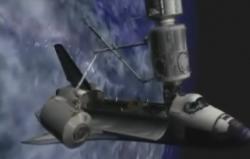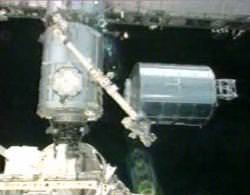The ESA Columbus module is now attached to the Harmony module on the International Space Station after a successful spacewalk by Space Shuttle Atlantis crew members Stan Love and Rex Walheim. Although Columbus installation was postponed for a day, today’s (Monday) spacewalk was completed in 7-hours and 58-minutes, concluding at 5:11pm EST.
The European Columbus space laboratory has been successfully attached to the Harmony module on the International Space Station. Although the mission took longer than expected, almost eight hours, the spacewalk appears to be a resounding success. Sunday’s planned effort to unpack and attach the module had to be postponed due to an undisclosed medical problem with German astronaut Hans Schlegel. Americans Stan Love and Rex Walheim took over today, probably much to the frustration of Schlegel who had to watch events from inside the station. The medical problem is said not to be serious.
Walheim: “Welcome to spacewalking, buddy.”
Love: “It’s awesome.”
– Communication between the two astronauts as Stan Love embarked on his first ever EVA on Monday.
It’s not all bad news for Schlegel, he is expected to assist in a spacewalk on Wednesday to continue the installation.

In today’s successful docking of Columbus, the first task was to prepare the Power Data Grapple Fixture on the module so the ISS could capture it with its robotic arm. The arm was operated today by astronaut Leland Melvin, former wide receiver in the US National Football League, and the 12.8 ton module steered to its new home as an extension of the space station. In addition to this, the astronauts prepared for the removal of the Nitrogen Tank Assembly (NTA), a component in the station’s thermal control system. The next spacewalk on Wednesday will install a new assembly after removing the old one. This task had to be carried out as the existing NTA was running low of nitrogen.
Source: BBC

